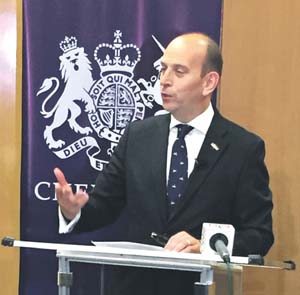
THE United Kingdom will not commit itself to the Department of Labor and Employment’s proposal for Filipino nurses and health care workers to be exempted from the 5,000 annual limit on deployment in exchange for getting an assured supply of Covid-19 vaccines, a supposed barter that Philippine officials have clarified.
“In my last talk with (DOLE Secretary Silvestre) Bello, I said we brought no plans to link vaccines with those conversations around the recruitment of nurses,” UK Ambassador Daniel Pruce said in a zoom meeting with reporters.
The DOLE has sought to clarify the matter, saying it did not mean a physical supply of vaccines, but simply wanted the foreign governments of UK and Germany to shoulder the cost of inoculating the Filipino healthcare workers deployed to them.
Pruce said he hopes to speak again on this issue in the coming weeks to continue a wider discussion on the subject.
He said the UK has two separate discussion tracks on the matter: one, the question of Filipino health care professionals in the UK, where they have a highly successful and productive relationship, and two, “a separate question of work in the UK.”
“The embassy supports the Philippines to secure access to vaccines that have been developed independently,” he added.
Two days ago, Labor Secretary Silvestre Bello III requested the UK and Germany to provide the Philippines with Covid-19 vaccines in exchange for exemption from the 5,000 annual limit on deployment of Filipino nurses and other health care workers.
International Labor Affairs Bureau Director Alice Visperas said Bello has spoken with the UK ambassador to the Philippines regarding the matter.
Among the requests made by Bello to the UK, according to Visperas, was an exchange for the exemption on the deployment cap, and the renewal of the 2002 and 2003 bilateral labor agreements between the UK and the Philippines, as well as the provision of vaccines.
Pruce, meanwhile, announced that the Philippines was given 10 million doses of Oxford-Astra Zeneca vaccine developed in the UK, after the country was included among the first-round list of countries who will receive free Covax vaccine allocations. The Philippines, embroiled in a lengthy discussion on Covid-19 acquisition, has finally approved the emergency use allocation (EUA) for several vaccines and expects the doses to arrive at the end of this month.
COVAX, Pruce stressed, “is the best mechanism to assure equitable access to vaccines globally,” referring to the world Health Organization-chamopned facility for ensuring equitable access to vaccines around the world.
The Ambassador confirmed meeting with Labor Secretary Silverstre Bello IIII a few weeks ago on the Philippine proposal, but said the UK prefers to assist developing nation’ access to Covid-19 vaccines through the WHO’s Covax facility, where he said his country has taken a lead role.
“As you know, the UK has made emphatic commitments that will be passed to Covax facility that distribution of surplus vaccines for developing countries would be managed.”
He added that the UK “were doing that because we’re committed to ensuring that vaccines, as they become available, are distributed on a fair and equitable manner.”
The UK is a top deployment destination of Filipino nurses and health care workers in the world.
Pruce lauded the Filipinos professionalism, competence and significant contributions to Britain’s healthcare system, particularly during the pandemic, when a couple of them were even given awards by the British government.
“They bring enormous compassion and empathy and caring for patients they look after. We consider ourselves blessed,” he added.
Labor reacts
Labor groups, meanwhile, slammed the DOLE’s pitch, framed by critics as a “barter” of health care workers (HCWs) for vaccine.
The agency was quick to belie the allegation, which it tagged as a misunderstanding of its intention to ensure the protection of HCWs and their host country from infection.
Labor coalition Nagkaisa did not buy the explanation of DOLE in requesting for vaccines for about 600,000 overseas Filipino workers (OFW) as a condition before it considers exempting the United Kingdom and Germany from the deployment cap for HCWs.
The group maintained the government should just remove the deployment restriction without any condition, especially since it hinders employment opportunities of HCWs.
Mutually beneficial
In a online press briefing on Wednesday, DOLE spokesperson Rolly Francia said the government is unlikely to lift the deployment cap during the pandemic.
To recall, the Philippine Overseas Employment Administration (POEA) imposed the 5,000 deployment quota to ensure the country will have enough HCWs to help in the government’s ongoing response to Covid-19.
However, he said the government may increase the quota for some countries which can ensure the protection of HCWs from infection, as what is being negotiated by Bello with UK and Germany.
He clarified that DOLE is not asking for physical doses, but to shoulder the cost of the Covid-19 vaccines, which will be used for OFWs.
Italy Labor Attache Maria Corina Padilla-Bunag said the move will provide the necessary protection to OFWs during the pandemic.
“It is really just part of the process for the protection of not only the workers but also the employers, family,” Bunag said.
Consistent policy
While stressing that the country already has sufficient vaccines to inoculate 70 million Filipinos, Presidential spokesperson Harry Roque lauded the initiative of DOLE, which he said is consistent with the policy of the national government, to secure vaccines for more Filipinos.
Read full article on BusinessMirror


